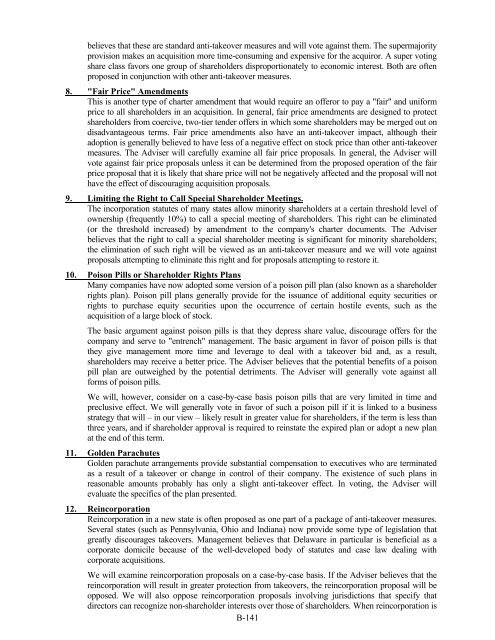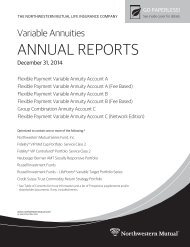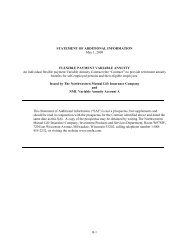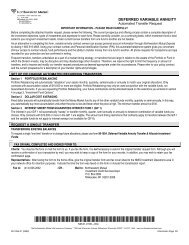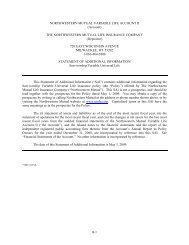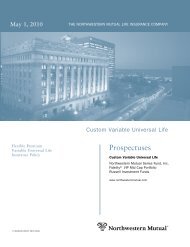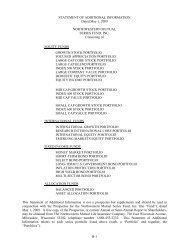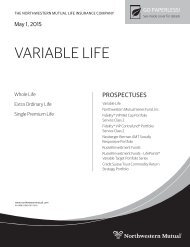B-1 STATEMENT OF ADDITIONAL INFORMATION Dated May 1 ...
B-1 STATEMENT OF ADDITIONAL INFORMATION Dated May 1 ...
B-1 STATEMENT OF ADDITIONAL INFORMATION Dated May 1 ...
Create successful ePaper yourself
Turn your PDF publications into a flip-book with our unique Google optimized e-Paper software.
elieves that these are standard anti-takeover measures and will vote against them. The supermajorityprovision makes an acquisition more time-consuming and expensive for the acquiror. A super votingshare class favors one group of shareholders disproportionately to economic interest. Both are oftenproposed in conjunction with other anti-takeover measures.8. "Fair Price" AmendmentsThis is another type of charter amendment that would require an offeror to pay a "fair" and uniformprice to all shareholders in an acquisition. In general, fair price amendments are designed to protectshareholders from coercive, two-tier tender offers in which some shareholders may be merged out ondisadvantageous terms. Fair price amendments also have an anti-takeover impact, although theiradoption is generally believed to have less of a negative effect on stock price than other anti-takeovermeasures. The Adviser will carefully examine all fair price proposals. In general, the Adviser willvote against fair price proposals unless it can be determined from the proposed operation of the fairprice proposal that it is likely that share price will not be negatively affected and the proposal will nothave the effect of discouraging acquisition proposals.9. Limiting the Right to Call Special Shareholder Meetings.The incorporation statutes of many states allow minority shareholders at a certain threshold level ofownership (frequently 10%) to call a special meeting of shareholders. This right can be eliminated(or the threshold increased) by amendment to the company's charter documents. The Adviserbelieves that the right to call a special shareholder meeting is significant for minority shareholders;the elimination of such right will be viewed as an anti-takeover measure and we will vote againstproposals attempting to eliminate this right and for proposals attempting to restore it.10. Poison Pills or Shareholder Rights PlansMany companies have now adopted some version of a poison pill plan (also known as a shareholderrights plan). Poison pill plans generally provide for the issuance of additional equity securities orrights to purchase equity securities upon the occurrence of certain hostile events, such as theacquisition of a large block of stock.The basic argument against poison pills is that they depress share value, discourage offers for thecompany and serve to "entrench" management. The basic argument in favor of poison pills is thatthey give management more time and leverage to deal with a takeover bid and, as a result,shareholders may receive a better price. The Adviser believes that the potential benefits of a poisonpill plan are outweighed by the potential detriments. The Adviser will generally vote against allforms of poison pills.We will, however, consider on a case-by-case basis poison pills that are very limited in time andpreclusive effect. We will generally vote in favor of such a poison pill if it is linked to a businessstrategy that will – in our view – likely result in greater value for shareholders, if the term is less thanthree years, and if shareholder approval is required to reinstate the expired plan or adopt a new planat the end of this term.11. Golden ParachutesGolden parachute arrangements provide substantial compensation to executives who are terminatedas a result of a takeover or change in control of their company. The existence of such plans inreasonable amounts probably has only a slight anti-takeover effect. In voting, the Adviser willevaluate the specifics of the plan presented.12. ReincorporationReincorporation in a new state is often proposed as one part of a package of anti-takeover measures.Several states (such as Pennsylvania, Ohio and Indiana) now provide some type of legislation thatgreatly discourages takeovers. Management believes that Delaware in particular is beneficial as acorporate domicile because of the well-developed body of statutes and case law dealing withcorporate acquisitions.We will examine reincorporation proposals on a case-by-case basis. If the Adviser believes that thereincorporation will result in greater protection from takeovers, the reincorporation proposal will beopposed. We will also oppose reincorporation proposals involving jurisdictions that specify thatdirectors can recognize non-shareholder interests over those of shareholders. When reincorporation isB-141


